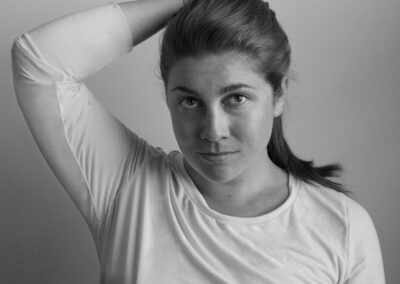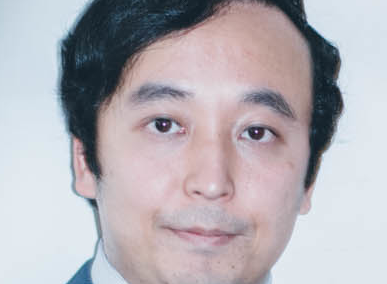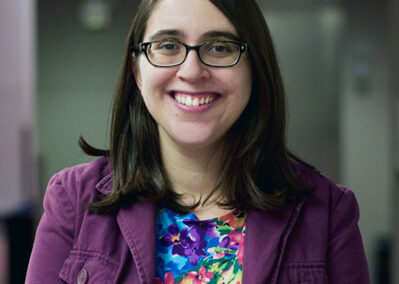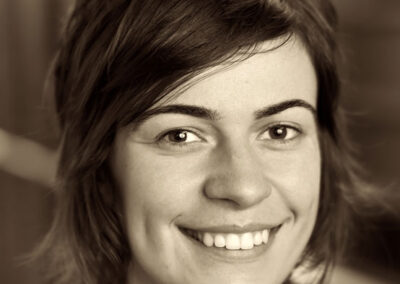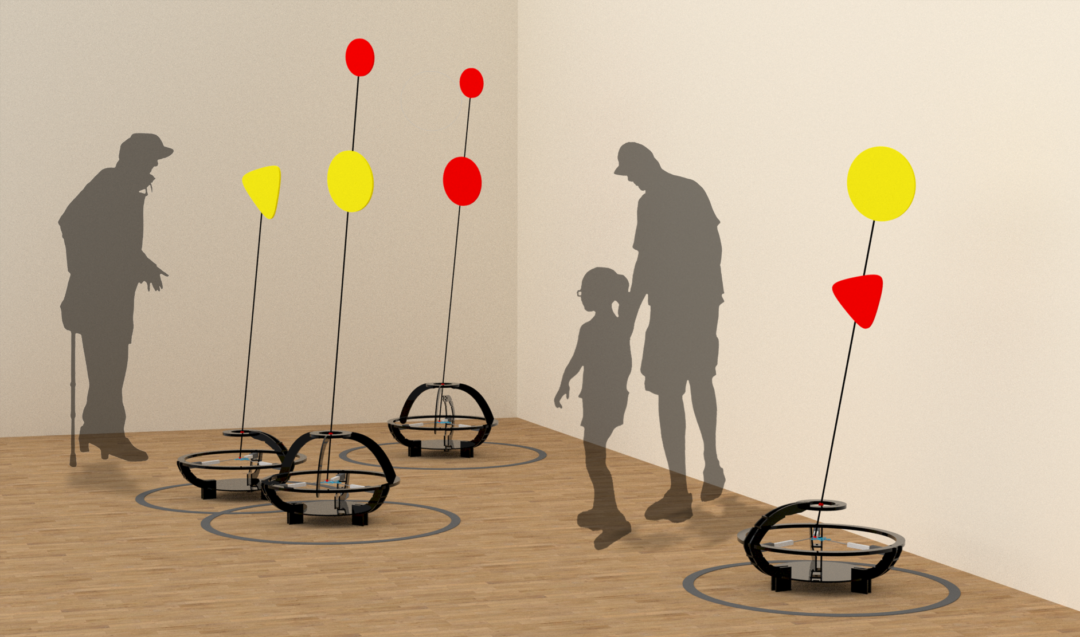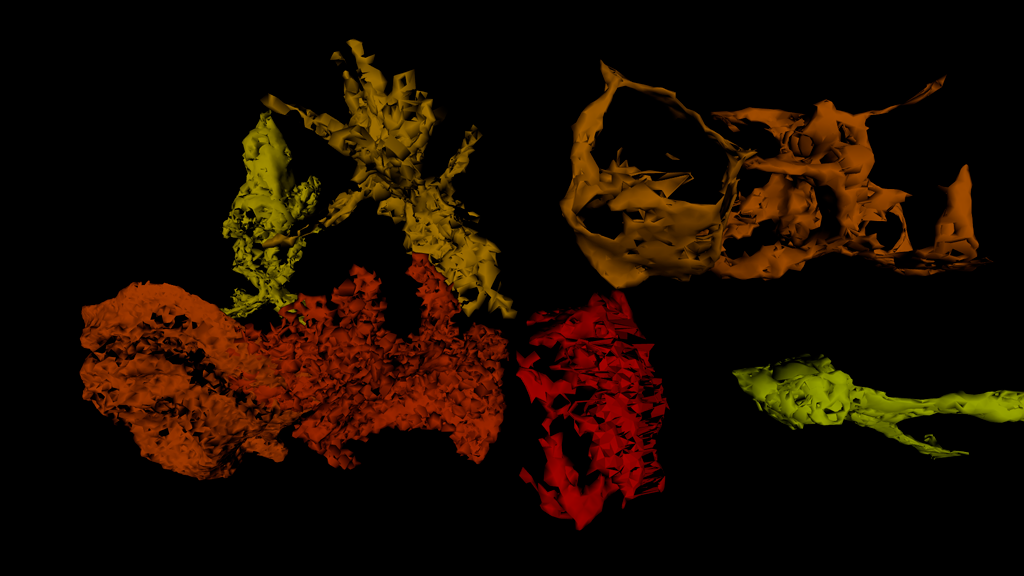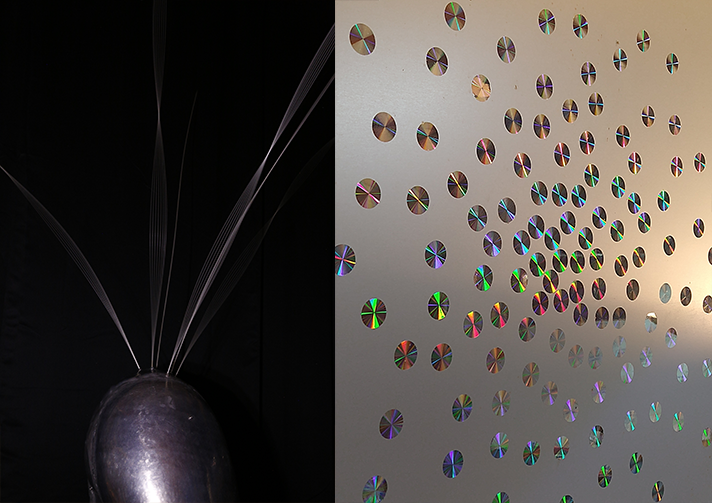Automating Expressions
ICRA 2022 – Robotics and Art
23 May
Hybrid.
Program
*Times are in EDT
8:00 am – 11:00 am Tutorial in Movement Studies, led by Cat Maguire (LIMS)
8:00 – 8:50 – Components for describing movement: Body, Effort, Space, Shape, and Time
9:00 – 9:50 – Notation and observation tutorial
10:00 – 10:50 – Function/expression in movement
11:00 am – 12:00 pm Conversation on making robotic art with Madeline Gannon (Aton Aton and FIU) and Catie Cuan (Stanford) moderated by Naoko Abe (U of Sydney)
12:00 pm – 1:45 pm Lunch
1:45 pm – 2:00 pm Predoctoral Provocations, led by Alli Nilles
Ideas, questions, and otherwise from pre-doctoral participants [Submit your provocation]
2:00 pm – 4:00 pm Invited Panels
2:00 – 3:00 – Relating movement quality to emotion, style, and aesthetics, moderated by James Wang with Rachelle Tsachor (UIC), Aaron Hertzmann (Adobe), Anca Dragan (Berkeley), and Heather Knight (OSU)
3:00-4:00 – Incorporating qualitative methods, subjective experience in automation, moderated by Damith Herath with Elizabeth Jochum (Aalborg), Naomi Fitter (OSU), Elin Bjorling (UW), and Hirotaka Osawa (Tsukuba)
4:00 pm – 5:00 pm Workshop debrief and networking, moderated by Amy LaViers. Identify lessons learned, ideas generated, and questions moving forward.
5:00 pm – 6:00 pm exhibition Tourvisit galleries to view robotic art installations
6:30 pm – Post-workshop Dinner (Optional)
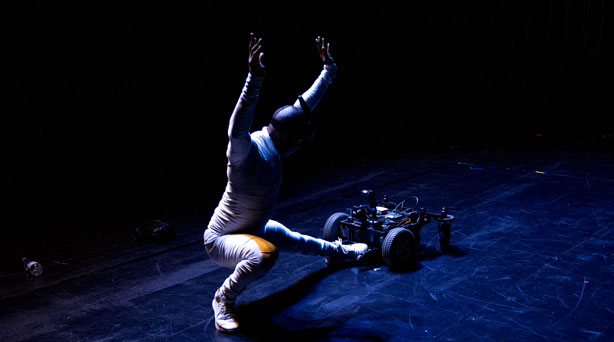
The Dynamic Still, (pictured Sandro Masai) investigates what it means for people and robots to move together. (courtesy Elizabeth Jochum)
About the Workshop
What are the aspects of work that can’t be — or have not yet been — automated? As we work to bring robots out of the factory and into humans’ everyday life, it is important to design the expression of their movement with greater care. An area of work that is promising for helping in this task is the performing arts where professionals are trained in techniques for design and description of movement.
Building on a decade of robotics and arts workshops at ICRA, in this workshop, participants will explore movement from an embodied, expressive perspective and discuss the challenges of incorporating that perspective in automation. First, participants will learn about a set of concepts, terms, and principles, including notation, utilized by many dancers and actors in a mini tutorial. This tutorial will be followed by a conversation about movement notation and intellectual property. The goal of this morning session will be to attune participants to the philosophy of many movement professionals and provide key takeaways that may be of use in their research. At lunch, a live performance, featuring human dancers leveraging automation, will provide entertainment and further discussion of bodily expression. Then, in the afternoon session a panel of experts will be assembled to discuss the challenges of working in this intersectional field as prompted by provocations from junior researchers. Finally, the day will conclude with breakout sessions for targeted discussions about the benefits and challenges of working in this way and for brainstorming sessions that will hopefully spawn new collaborations and directions, strengthening and growing this long-standing community at ICRA.
Provocations
To connect early-career researchers with the established group of invited presenters and panellists, we’ve decided on a “provocations” format this year. In this format, we invite early-career researchers to submit questions, ideas, comments, or critiques that will seed the discussions on our two-afternoon panels (which are nominally centred around topics of “relating movement quality to emotion, style, and aesthetics” and “incorporating qualitative methods, subjective experience in automation”). We hope this process can help introduce junior researchers to the community, but we recognize that not everyone feels safe being “provocative” early in their career. If you submit anonymously and your provocation is chosen for participation, a moderator will present your provocation to the panel.
Submit before 16th May 2022.
Expressive and Meditative Machines for Imagining New Futures With Technology
ICRA 2022 Robotics and Art Exhibition
319 N. 11th Street, Philadelphia, PA 19107
The exhibition comprises a series of robotic art themed exhibitions at the galleries on the 2nd floor of 319 N. 11th Street. The participating galleries, Marginal Utility, Pink Noise Projects,and Grizzly Grizzly, will all be opening new exhibits to coincide with the International Conference on Robotics and Automation (ICRA). Exhibits will include a site specific installation featuring Kate Ladenheim’s The Sublime Grandeur of Inconsequential Death, an interactive, inflatable anti-monument. Grizzly Grizzly’s exhibition, Illuminations, explores a father-son exhibition featuring “Tsaibernetic” sculptures by London Tsai and 2D work by his late father, Wen-Ying Tsai, a pioneer of cybernetic sculpture. In Grizzly Grizzly’s annex the exhibition Total Information Awareness, which was put on hold for 2 years because of the pandemic, features Hasan Elahi, Mike Osborne, and Jeff Thompson; artists who use information as a material, strategy for making, observing, and bringing awareness. Marginal Utility’s exhibit, Ambiguous and Alluring, Imagined by AI features Machine Learning algorithms and custom interactive systems developed by artist Eunsu Kang and her collaborators. Naomi Leonard and Susan Marshall with collaborators María Santos, Sarah Witzman, Isla Xi Han, and Kathryn Wantlin bring Rhythm Bots, an actively controlled kinetic sculpture of synchronously moving robots, to Pink Noise Projects.
Please RSVP/register for the workshop aligned gallery visits and events between 23-25 May. Details specific to each exhibit can be accessed by clicking the images below.
Monday
Tuesday
May 24 – 5:00 PM to 7:00 PM
Tour with the curators and artists, Wine Reception,
Ticketed event. $25 per person, $10 for students.
Tickets here.
Wednesday
Organised by

Amy LaViers
Amy LaViers works at the intersection of robotics and dance. She is the director of the Robotics, Automation, and Dance (RAD) Lab, a nonprofit organization based in Philadelphia, PA. Her writing, choreography, and machine designs have been presented internationally at both performing arts and engineering venues, including Nature, Merce Cunningham’s studios, Joe’s Pub at the Public Theater, the Performance Arcade, Berkeley, Princeton, and Georgia Tech. Her teaching has been recognized on the University of Illinois at Urbana-Champaign’s list of Teachers Ranked as Excellent by Their Students with Outstanding distinction, and she is a recipient of DARPA’s Young Faculty Award and Director’s Fellowship. Photo by Peter Tsai.

Damith Herath
Damith Herath is an Associate Professor in Robotics and Art at the University of Canberra. Damith is a multi-award winning entrepreneur and a roboticist with extensive experience leading multidisciplinary research teams on complex robotic integration, industrial and research projects for over two decades. He founded Australia’s first collaborative robotics startup in 2011 and was named one of the most innovative young tech companies in Australia in 2014. Teams he led in 2015 and 2016 consecutively became finalists and, in 2016, a top-ten category winner in the coveted Amazon Robotics Challenge – an industry-focussed competition amongst the robotics research elite. In addition, Damith has chaired several international workshops on Robots and Art and is the lead editor of the book “Robots and Art: Exploring an Unlikely Symbiosis” – the first significant work to feature leading roboticists and artists together in the field of Robotic Art.

Alli Nilles
Alli Nilles is a Postdoctoral Associate in the Collective Embodied Intelligence lab at Cornell University, directed by Prof. Kirstin Petersen. She received her Ph.D. in Computer Science from the University of Illinois at Urbana-Champaign, where she also took classes in modern dance and contact improvisation. Her research focuses on algorithms and design software for simple mobile robots that deliberately make contact with their environment or other agents, with an emphasis on mathematical modelling of emergent dynamics and embodied computation

Diedra Krieger
Diedra Krieger is an artist and curator working at the intersection of art and robotics. Diedra Krieger has been the Lab Coordinator for Kod*lab since 2012 and is excited about her new initiative the Robotics Art Residency at GRASP at PERCH. She is a member of the artist-run curatorial collective, Grizzly Grizzly, and participated in a group exhibition with them at Cedar Crest College in September 2021. Her work “Waddle Waddle” was juried into the RSS 2021 Robotics X Arts Exhibition. In 2018, posters of her art work were published with Science Through Narrative Symposium, Society for Integrative and Comparative Biology and Women in Computing Conference. She was a 2012-13 Artist-in-Residence at 40th Street AirSpace. Diedra earned an MFA from Vermont College of Fine Art, an MA from Monash University in Development Studies and a BA from New York University.

James Z. Wang
James Z. Wang is a Distinguished Professor of the College of Information Sciences and Technology at The Pennsylvania State University. He received the bachelor’s degree in mathematics summa cum laude from the University of Minnesota, and the MS degree in mathematics, the MS degree in computer science, and the PhD degree in medical information sciences, all from Stanford University. His research interests include image analysis, image modeling, image retrieval, and their applications. He was a visiting professor at the Robotics Institute at Carnegie Mellon University (2007-2008), a lead special section guest editor of the IEEE Transactions on Pattern Analysis and Machine Intelligence (2008), and a program manager at the Office of the Director of the National Science Foundation (2011-2012). He is on the editorial board of the IEEE BITS — The Information Theory Magazine’s special issue on Information Processing in Arts and Humanities (2022). He was a recipient of a National Science Foundation Career award (2004) and Amazon Research Awards (2018, 2019, 2020).
News & Updates
If you are planning to attend the workshop online, the ICRA registration is free. Please RSVP for online attendance here. For in-person attendance, please register with ICRA.
The call for participation is live now. If you are an early career researcher please consider submitting to the call for provocations!
We are continuing to update the website with new speakers and the program. Please bookmark and visit regularly for updates and exciting new additions to the program.

